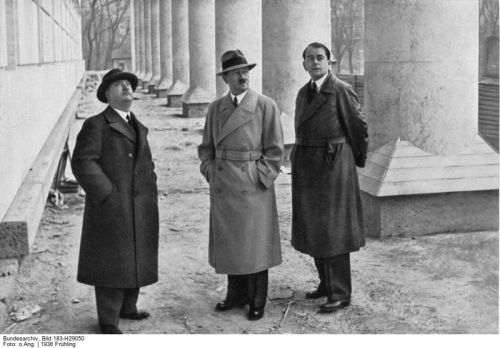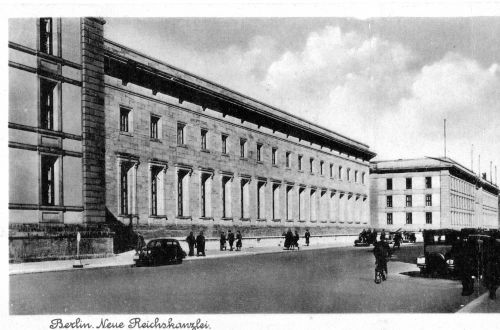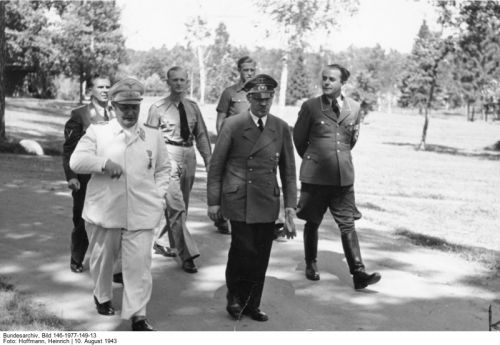Albert Speer

Professor Leonard Gall, Adolf Hitler, Albert Speer - Haus der Deutschen Kunst in Munich (Bundesarchiv)
Albert Speer was born on March 19, 1905, in Mannheim, the son of a prosperous upper-middle -class family of master builders. His father also called Albert was an architect in the city. Albert Speer was educated at the Institute of Technology in Karlsruhe, completing his architectural studies in Munich and Berlin. It was at Berlin University that he first heard Adolf Hitler speak in 1930, and he came under Hitler's hypnotic spell.
In January 1931, Speer joined the National Socialist Party, denying, as he subsequently wrote in his memoirs, 'my own past, my upper -middle-class origins and my previous environment.' Hitler appeared to the young Speer to offer the complete answer to Communism and the political futility of the Weimar system. It was the personality of the Fuhrer, rather than the Nazi Party itself, which attracted Speer, who was able through his close personal relationship with Hitler to realise all his youthful architectural ambitions, to design and build for the New Order.
In 1932, he received his first commission from the Nazi Party and after 1933, he was responsible for the designs and decorations used in the large Party rallies, beginning with the May 1st, celebration on the Tempelhofer field. He perfected the Nazi style of public parades, the monumental liturgy of the movement, using inventive lighting effects and rapidly erected flag poles with great skill to enhance the Reich Party rallies at Nuremberg. His skill and flair for organisation impressed Adolf Hitler, who came to regard Speer as an 'architect of genius' and Hitler gave him a stream of projects to design, including the new Reich Chancellery in Berlin and the Nazi Party palace in Nuremberg.

Berlin - New Reich Chancellery (Chris Webb Private Archive)
Speer's artistic imagination and technological expertise appealed to Hitler, who himself was a 'frustrated architect,' and Hitler appointed Speer to the position of Inspector -General of the Reich, responsible for re-building Berlin and other German cities in the neo-classical, monumental style which he favoured. Speer's task was to convert the visions of a grandiose German Reich into an imposing architectural reality. In 1938, Speer, who already enjoyed the honorary title of Professor, was made a Prussian State Councillor and received the Nazi Golden Party Badge of Honour. Speer was also a Section Leader of the German Labour Front and he also headed its ' Beauty of Labour' Department.
During 1941, he was elected to represent the electoral district of Berlin West in the Reichstag. The many posts Albert Speer held during the Second World War included General -Inspector of Water and Energy and head of the Nazi Party's main office for technology. From 1942, he was also a member of the Central Planning Office. In February 1942, he succeeded Fritz Todt, who died on February 8, 1942, in a plane crash, shortly after take off from Hitler's headquarters, the Wolfsschanze, near Rastenburg, in East Prussia, as the Minister of Armaments and War Production.
In this role Albert Speer demonstrated remarkable talent as a manager of industrial enterprises on a gigantic scale. During the next three years Speer was the greatest employer of manpower in Nazi Germany and performed miracles in rapidly expanding war production capacity, in spite of massive Allied bombing attacks. Output was increased from 9,540 front-line machines and 2,900 heavy tanks in 1941, to 35,350 machines and 17,300 tanks in 1944, under Speer's relentless prodding and efficiency.
In his role as Minister of Armaments, Speer not only kept the German military machine in the field - thereby prolonging the war by at least two years - he also showed no scruples in exploiting all the slave labour he could get his hands on. Nevertheless, in the final stages of the war, Speer became increasingly disillusioned with Hitler's policy of 'victory or annihilation' and tried to protect German industry from the Fuhrer's orders to destroy all areas threatened by the advancing Allied forces.

Goering, Hitler and Speer, at the Fuhrerhauptquartier August 1943 (Bundesarchiv)
Though he never sought contact with the conspirators of the July 20, 1944, attempt on Hitler's life at the Fuhrerhauptquartier, Speer did contemplate killing Hitler, but abandoned the idea, attempting to the end to balance rational argument with the illusions of the fantasy world in the Fuhrer Bunker in Berlin. Speer's loyalty to Hitler did not lead him to abandon his critical intelligence or independent will, though he continued to shelter behind the fiction of being a strictly 'non-political' specialist. In contrast to other Nazi leaders, Speer, however, did acknowledge the guilt of the Nazi regime when brought before the International Military Tribunal at Nuremberg in 1946. Speer recognised the inadmissibility of obeying orders, as an excuse for serving a criminal State and admitted his personal responsibility for the slave labour in the factories under his authority and for his collaboration with the SS when it provided concentration camp prisoners, to work on his production lines.
Speer was found guilty of war crimes against humanity, but it was recognised in mitigation that, in the closing stages of the war, he was one of the few among Hitler's inner circle, who had the courage to tell Hitler that the war was lost and to take steps to prevent the senseless destruction of production facilities. Albert Speer was sentenced to twenty years' imprisonment on September 30, 1946. The Russians who had voted to hang him, ensured that he served the full term in Spandau Prison in Berlin. Speer was released from Spandau in 1966.
During his imprisonment, Speer wrote the first draft of his best -selling memoirs, 'Inside the Third Reich,' which was published in 1970, which gave a detailed, dispassionate account of his years at Hitler's side and the rivalries within the Nazi hierarchy. One of the most impressive descriptions of the inner workings of the Third Reich, it strengthened the view of many historians that Speer was a man of integrity and honour, in comparison with the criminal leaders, who were his associates. His personal qualities notwithstanding, Speer was the prototype of the intellectual technocrat without whose efficient and loyal service the modern totalitarian State could never have consummated its lawless acts of violence.
Albert Speer died in a London hospital on September 1, 1981, during a visit to the United Kingdom.
Sources
R.S. Wistrich, Who’s Who in Nazi Germany, published by Routledge, London and New York 1995
Leaders and Personalities of the Third Reich by Charles Hamilton, published by R.James Bender Publishing. San Jose, USA 1984.
Photographs – Bundesarchiv, Chris Webb Private Archive
© Holocaust Historical Society 2019

